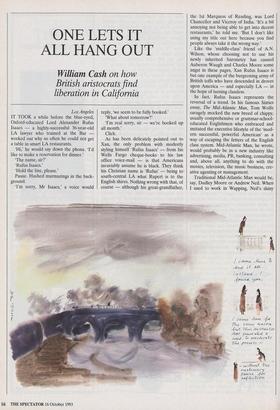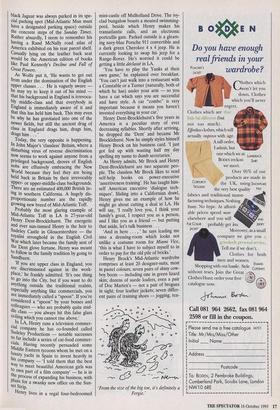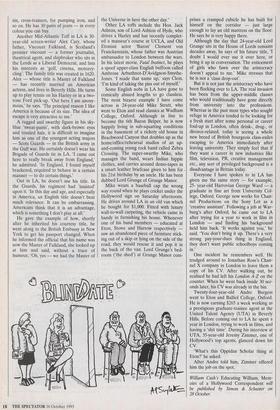ONE LETS IT ALL HANG OUT
William Cash on how
British aristocrats find liberation in California
Los Angeles IT TOOK a while before the blue-eyed, Oxford-educated Lord Alexander Rufus Isaacs — a highly-successful 36-year-old LA lawyer who trained at the Bar worked out why so often he could not get a table in smart LA restaurants.
`Hi,' he would say down the phone. 'I'd like to make a reservation for dinner.'
`The name, sir?'
`Rufus Isaacs.'
`Hold the line, please.'
Pause. Hushed murmurings in the back- ground.
`I'm sorry, Mr Isaacs,' a voice would reply, 'we seem to be fully booked.'
`What about tomorrow?'
`I'm real sorry, sir — we're booked up all month.'
Click.
As has been delicately pointed out to Xan, the only problem with modestly styling himself 'Rufus Isaacs' — from his Wells Fargo cheque-books to his law office voice-mail — is that Americans invariably assume he is black. They think his Christian name is 'Rufus' — being to south-central LA what Rupert is to the English shires. Nothing wrong with that, of course — although his great-grandfather, the 1st Marquess of Reading, was Lord Chancellor and Viceroy of India. 'It's a bit annoying not being able to get into decent restaurants,' he told me. 'But I don't like using my title out here because you find people always take it the wrong way.'
Like the 'middle-class' friend of A.N. Wilson, whose choosing not to use his newly inherited baronetcy has caused Auberon Waugh and Charles Moore some angst in these pages, Xan Rufus Isaacs is but one example of the burgeoning army of British toffs who have descended in droves upon America — and especially LA — in the hope of turning classless.
In fact, Rufus Isaacs represents the reversal of a trend. In his famous Sixties essay, The Mid-Atlantic Man, Tom Wolfe savagely mocked the new breed of chippy, usually comprehensive or grammar-school- educated Englishmen who embraced and imitated the executive lifestyle of the 'mod- em successful, powerful American' as a way of escaping the fetters of the English class system. Mid-Atlantic Man, he wrote, would probably be in a new industry like advertising, media, PR, banking, consulting and, above all, anything to do with the movies, television, the music business, cre- ative agenting or management.
Traditional Mid-Atlantic Man would be, say, Dudley Moore or Andrew Neil. When I used to work in Wapping, Neil's shiny black Jaguar was always parked in its spe- cial parking spot (Mid-Atlantic Man must have a designated parking space) outside the concrete steps of the Sunday Times. Rather absurdly, I seem to remember his having a Rand McNally road atlas of America exhibited on his rear parcel shelf. Casually lying on the leather back seat Would be the American edition of books like Paul Kennedy's Decline and Fall of Great Powers.
As Wolfe put it, 'He wants to get out from under the domination of the English upper classes . . . He is vaguely aware he may try to keep it out of his mind that his background in England is irrevoca- bly middle-class and that everybody in England is immediately aware of it and that this has held him back. This may even be why he has gravitated into one of the newer fields, but still the ancient drag of class in England drags him, drags him, drags him .
Today, the very opposite is happening. In John Major's 'classless' Britain, where a disturbing virus of reverse discrimination now seems to work against anyone from a privileged background, droves of English nobs are effusively embracing the New World because they feel they are being held back in Britain by their irrevocably upper- or upper-middle-class backgrounds. Th ere are an estimated 400,000 British liv- ing in southern California. A hugely dis- proportionate number are the rapidly growing new breed of Mid-Atlantic Toff. Probably the most glaring example of Mid-Atlantic Toff in LA is 27-year-old Henry Dent-Brocklehurst. The energetic and ever sun-tanned Henry is the heir to Sudeley Castle in Gloucestershire — the royalist stronghold in the English Civil War which later became the family seat of the Dent glove fortune. Henry was meant to follow in the family tradition by going to Sandhurst.
If you are upper class in England, you are discriminated against in the work- place,' he frankly admitted. 'It's one thing to go into the City, but if you want to do anything outside the traditional realms, especially anything like commercials, you are immediately called a "spoon". If you're Considered a "spoon" by your bosses and colleagues — who are probably quite mid- dle class — you always hit this false glass ceiling which you cannot rise above.' . In LA, Henry runs a television commer- company he has co-founded called Sudeley Productions — notable successes so far include a series of cat-food commer- cials. Having recently persuaded some Middle Eastern tycoons whom he met on a Fury yacht in Spain to invest heavily in his Company — 'I told them that the best way to meet beautiful American girls was !,° own part of a film company' — he is in the process of expanding his business, with plans for a swanky new office on the Sun- set Strip. Henry lives in a regal four-bedroomed mini-castle off Mulholland Drive. The ivy- clad bungalow boasts a moated swimming- pool, beside which Henry makes his transatlantic calls, and an electronic portcullis gate. Parked outside is a gleam- ing navy-blue Porsche 911 convertible and a dark green Cherokee 4 x 4 jeep. He is currently looking to swap his jeep for a Range-Rover. He's worried it could be getting a little déclassé in LA. `You have to play the Yanks at their own game,' he explained over breakfast. `You can't just walk into a restaurant with a Constable or a Turner (naturally, both of which he has) under your arm — so you have a car which says you are successful and have style. A car "combo" is very important because it means you haven't invested everything in your car.' Henry Dent-Brocklehurst's five years in America is a peculiar story of ever decreasing syllables. Shortly after arriving, he dropped the 'Dent' and became Mr Brocklehurst. Now he simply styles himself Henry Brock on his business card. 'I just got fed up with wasting half my day spelling my name to dumb secretaries.' As Henry admits, Mr Brock and Henry Dent-Brocklehurst are two separate peo- ple. The classless Mr Brock likes to read self-help books on power-executive `assertiveness training'. He has taught him- self American executive `dialogue tech- niques'. Sliding into a Californian drawl, Henry gives me an example of how he might go about cutting a deal in LA. He will say, 'I really love you, I think your family's great, I respect you as a person, and I like you as a friend — but putting that aside, let's talk business . . .
`And in here . . . , ' he says leading me into a dressing-room which looks not unlike a costume room for Miami Vice, `this is what I have to subject myself to in order to pay for the old pile of bricks.' Henry Brock's Mid-Atlantic wardrobe comprises at least 20 designer-suits, most in pastel colours; seven pairs of shiny cow- boy boots — including one in green lizard skin; dozens of suede loafers, even a pair of Doc Marten's — not a pair of brogues in sight; four leather jackets; seven differ- ent pairs of training shoes — jogging, ten- `From the size of the big toe, it's definitely a Fergie.' nis, cross-trainers, for pumping iron, and so on. He has 30 pairs of jeans — in every colour you can buy.
Another Mid-Atlantic Toff in LA is 30- year-old screen-writer Alex Cary, whose father, Viscount Falkland, is Scotland's premier viscount — a former journalist, theatrical agent, and shipbroker who sits in the Lords as a Liberal Democrat, and lists his interests as 'golf, cinema, motorcy- cling'. The family title was created in 1620. Alex — whose title is Master of Falkland — has recently married an American actress, and lives in Beverly Hills. He turns up to play tennis on his Harley or in a two- tone Ford pick-up. 'Out here I am anony- mous,' he says. 'The principal reason I like America is because of its size. The idea of escape is very attractive to me.'
A rugged and swarthy figure in his sky- blue 'sweat-pants', with dark-brown eyes and tousled hair, it is difficult to imagine him as one of the youngest acting majors — Scots Guards — in the British army in the Gulf war. He certainly doesn't wear his Brigade of Guards tie in LA. 'I came out here to really break away from England,' he admitted. 'In England, I found myself bracketed, required to behave in a certain manner — to do certain things.'
Out in LA, he doesn't use his title. In the Guards, his regiment had 'insisted' upon it. 'In this day and age, and especially in America, an English title doesn't bear much relevance. It can be embarrassing. Americans think that it is an advantage, which is something I don't play at all.'
He gave the example of how, shortly after he inherited his courtesy title, he went along to the British Embassy in New York to get his passport changed. When he informed the official that his name was now the Master of Falkland, she looked up at him and said, without a trace of humour, 'Oh, yes — we had the Master of the Universe in here the other day.'
Other LA toffs include the Hon. Jack Ashton, son of Lord Ashton of Hyde, who drives a Harley and has recently complet- ed a masseur's course at UCLA, and Old Etonian actor 'Baron' Clement von Franckenstein, whose father was Austrian ambassador to London between the wars. In his latest movie, Fatal Instinct, he plays a spoof upper-class English buffoon called Ambrose Arbuthnot-D'Avidgnon-Smythe- Jones. 'I made that name up,' says Clem. `I'm kind of taking the piss out of myself.'
Some English nobs in LA have gone to comically absurd lengths to go classless. The most bizarre example I have come across is 24-year-old Mike Strutt, who went to Eton and read classics at Wadham College, Oxford. Although in line to become the 6th Baron Belper, he is now happily living in sub-squatting conditions in the basement of a rickety old house in Beachwood Canyon that doubles up as the home/office/rehearsal studios of an up- and-coming young rock band called Zebra Crossing. The super-swarthy Mike, who manages the band, wears Indian hippie clothes, and carries around demo-tapes in a smart leather briefcase given to him for . his 21st birthday by an uncle. He has been dubbed Lord Grunge of Grunge Manor.
Mike wears a baseball cap the wrong way round when he plays cricket under the Hollywood sign on Saturday afternoons. He drives around LA in an old van which he bought for $1,000. Fitted with luxury wall-to-wall carpeting, the vehicle came in handy in furnishing his house. Whenever one of his band members — educated at Eton, Stowe and Harrow respectively saw an abandoned piece of furniture stick- ing out of a skip or lying on the side of the road, they would rescue it and pop it in the back of the van. Lord Grunge's bed- room (`the shed') at Grunge Manor corn- prises a cramped cubicle he has built for himself on the corridor — just large enough to lay an old mattress on the floor. He says he is very happy there.
Although the day that 24-year-old Lord Grunge sits in the House of Lords remains decades away, he says of his future title, 'I doubt I would ever use it over here, or bring it up in conversation. The enticement of girls who fawn over the aristocracy doesn't appeal to me.' Mike stresses that he is not a 'class drop-out'.
But it is not just the aristocracy who have been flocking over to LA. The real invasion has been from the upper-middle classes who would traditionally have gone directly from university into the professions. Whereas in the past most types who sought refuge in America tended to be looking for a fresh start after some personal or career foul-up in London, often drink-, .drug-, or divorce-related, today is seeing a whole new breed of British bourgeois class-exiles escaping to America immediately after leaving university. They simply feel that if they want a career in new industries like film, television, PR, creative management etc., any sort of privileged background is a disadvantage in Britain today.
Everyone I have spoken to in LA has given me the same story — for example, 25- year-old Harrovian George Ward — a graduate in fine art from University Col- lege, Oxford. George now works for Chan- nel Productions on the Sony Lot as a `creative assistant'. Following a job at War- burg's after Oxford, he came out to LA after trying for a year to work in film in London — and finding his background held him back. 'It works against you,' he said. 'You don't bring it up. There's a very strong pay-your-dues thing in England, they don't want public schoolboys coming in.'
One incident he remembers well. He trudged around to Jonathan Ross's Chan- nel X company in London to leave them a copy of his CV. After walking out, he realised he had left his London A-Z on the counter. When he went back inside 30 sec- onds later, his CV was already in the bin.
Twenty-four-year-old Andre Burgess went to Eton and Balliol College, Oxford. He is now earning $265 a week working as a prestigious graduate-trainee agent at the United Talent Agency (UTA) in Beverly Hills. Before coming out to LA he spent a year in London, trying to work in films, and having a 'shit time'. During his interview at UTA, 35-year-old Jeremy Zimmer, one of Hollywood's top agents, glanced down his CV.
`What's this Oppidan Scholar thing at Eton?' he asked.
After Andre told him, Zimmer offered him the job on the spot.
William Cash's Educating William, Mem- oirs of a Hollywood Correspondent will be published by Simon & Schuster on 28 October.




























































 Previous page
Previous page